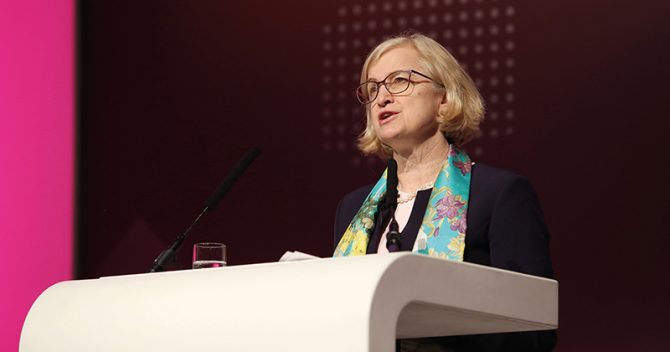Several industries where project-based employment is the norm have struggled more than most to comply with the 12-month minimum apprenticeships rule, but their fortunes could be about to change.
Chancellor of the Exchequer Rishi Sunak announced in the Budget on Wednesday a £7 million fund to run so-called “portable” or “flexi-job” apprenticeships in sectors such as creative and construction.
This “new approach” will involve organisations applying for money to start new agencies which employ apprentices and place them with multiple employers.
It is targeted at those industries that cannot offer a long-enough placement with a single employer for apprentices to meet the government’s minimum 12-month duration requirement. In the TV and film sector, for example, most roles are freelance and usually only run for two to three months.
The flexi-job model was lauded by prime minister Boris Johnson during a speech on adult skills last year, after a meeting between ministers and his influential skills advisor Professor Alison Wolf decided the government should press ahead with its
introduction. It also featured briefly in this year’s FE white paper.
The scheme will become the third agency-type model for apprenticeships, following Apprenticeship Training Agencies (ATAs) and Group Training Associations (GTAs), which have been established for many years but have arguably become neglected by policymakers.
The Department for Education, which is responsible for the scheme, has promised a consultation on the proposals.
Levy problems ‘particularly stark’ for creative industries
Flexi-job apprenticeships are being specifically targeted at industries where work is often patchy. Workers in the creative sector, for example, who are finishing off one high-end television show will often wait weeks before starting on a big-budget blockbuster, for instance.
As Mark Heholt, head of policy for representative body ScreenSkills, told FE Week, the problems the creative sector faces are “not unique, but it is particularly stark”.
About 50 per cent of screen sector workers – in film, TV, visual special effects, animation, games – are freelancers, and it is only “if you’re lucky that your jobs will join up, whereas when you’re an apprentice, you have to have a minimum 12-month contract with one employer. So, you can’t move around.
“If you were training to be a set builder, after you’ve built it you’d then have nothing to do until it’s time to take it back down again.”
This issue has led to the creative sector seriously underspending its apprenticeship levy. The Creative Industries Council (CIC), a representative body chaired by the culture and business secretaries and BBC director-general Tim Davie, estimates that out of a £70 million levy pot for the creative industries every year, about 20 per cent is used.
Both ScreenSkills and CIC are working closely with the government on the development of flexi-job apprenticeships.
Ian Woodcroft, policy and government relations manager for the construction training organisation CITB, told FE Week
his organisation had not been “directly involved” with discussions around the flexi-job scheme, but is “keen to understand more of the detail” around it, as they look to tackle similar problems. CITB runs its own shared apprenticeship scheme which has supported 300 apprentices so far.
To their credit, the government has recognised the problem and is acting to help these sectors utilise apprenticeships more easily.
The Skills for Jobs white paper, published in January, acknowledged that creative and construction face “barriers in making full use of apprenticeships,” due to their “varied and flexible employment patterns”.
It added that “sectoral apprenticeship agencies may offer one solution, giving constant employment to an individual during the life of their apprenticeship which allows them to move between work placements and continue their training”.
The Department for Digital, Culture, Media and Sport (DCMS) is also running a £100,000 pilot programme with ScreenSkills, Netflix and Warner Bros, which was launched in 2019.
The programme was halted by Covid-19 and is waiting for productions to start up again before resuming, but will involve training apprentices as broadcast production assistants and production accountants with placements at those two companies, which are match funding with their levy money.

Prime minister Boris Johnson, in his landmark speech on adult skills at Exeter College last September, said the government wanted to make more apprenticeships portable “so you can take them from company to company”.
FE Week understands, shortly before Johnson’s speech, Alison Wolf met with skills minister Gillian Keegan and DCMS’ digital skills minister Caroline Dinenage and decided that flexi-jobs – rather than other options, such as bulk transferring levy funds, or modular apprenticeships – would be the course of action.
Shortly afterwards, the spending review in November confirmed that during 2021-22, the government would “test approaches to supporting apprenticeships in industries with more flexible working patterns”.
How flexi-job apprenticeships will help
Although the Treasury has said employers will be expected to come forward and bid to set up the flexi-job agencies, Heholt expects it will be organisations like sector bodies and training providers instead.
ScreenSkills is itself planning to apply, and Heholt says it will be “critical the agency which employs the apprentices has a background and ability and the skill to look after them, to provide them with all the pastoral care, and all the rest of it.

“It also needs to have very good relationships and contacts with industry, so that it can arrange these multiple placements.”
The number of employers involved in each agency will “depend,” he says, on the role for which the apprentice is training.
If it is a set builder role, they may need five or six; if it’s a production accountant, with larger chunks of work, it may be only two.
The new agencies, he said, “will need to make sure they understand the kinds of roles, the typical duration of those roles. And therefore, how many placements the apprentice needs over the duration of the apprenticeship.”
Neil Hatton, chair of the CIC’s apprenticeship working group, believes there will be a rotating cast of employers: “You could easily get 20 or 30 employers and that may be a rotating 20 or 30.”
As well as scrapping the single employer precedent, the flexi-job apprentices will not be offered a job at the end of the programme, according to ScreenSkills and CIC – again due to the freelance nature of creative workers.
Hatton said, though: “If people come out at the end of the course and they’ve done well, they are going to be in demand.”
Ditching so many tenets of the reformed apprenticeship programme are likely to have implications for how providers report their delivery to the DfE.
When asked what the new scheme will mean for training providers, the department would only say it would consult on how “agency models can better support apprentices to complete their apprenticeships through a series of placements with employers”.
Reporting could be easier for providers under this model, reckons Heholt, as they will be dealing with one agency rather than any number of employers.
What about apprenticeship training agencies?
So far, much of what has been announced about these new flexi-job apprenticeships and their agencies sounds markedly similar to the pre-existing ATA and GTA models.
ATAs, which launched in 2009, employ apprentices and place them with a host employer, so the firms do not have to recruit an apprentice themselves.
GTAs, which started in the 1960s, are set up and governed by local employers who may not have enough resources on their own to train apprentices; so they club together to set up what Jon Graham, chief executive of group training association JTL, calls an “in-house training business”.
Why not use the structure that exists?
“The apprentice will be employed by the employer, but they send them to the GTA, and the employer will have some strategic direction as to what the training organisation does, and how they operate.”
The new flexi-jobs apprenticeship agencies model has provoked some bemusement from the GTA and ATA sectors. The DfE has even described the DCMS-ScreenSkills pilot as an “apprenticeship training agency model”.
Speaking to FE Week, Iain Elliott, who operates both an ATA and a GTA in Humber, asked: “Why not use the structure that exists?” He warned the government to not “reinvent the wheel”.
The Department for Education has said it “values the role good-quality ATAs and GTAs play in helping apprentices and employers access apprenticeships” and “wants to build on the success of existing models”.
But the creative sector has its own reasons why ATAs and GTAs have not been directly adopted.
Mark Heholt said ScreenSkills looked into the ATA model for the pilot, but found “there are none, which I’m aware of, which arrange multiple placements, over the course of the apprenticeship, which is where the all the cost and the complexity comes from”.
This is backed up by Elliott and Graham, with the latter saying they have occasionally used multiple employers informally where an apprentice’s “range of work might change” so they are suddenly working on one task such as cabling “and also need to do a bit of x, y, and z”.
Hatton has also said the creative sector does not have many ATAs, so there is not that existing infrastructure to work from, and he was unsure how ATAs could cope with the periods of little to no work in his sector.
The first flexi-job apprenticeships are expected to start in January 2022, with bids to the £7 million fund opening in July 2021.





